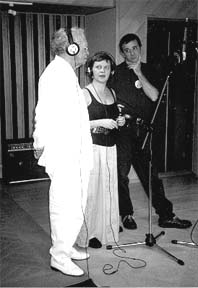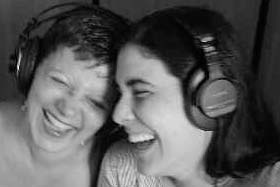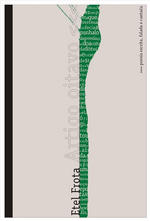|
Daniella
Thompson
Deep beauty
In Artigo Oitavo,
Etel Frota writes,
speaks, and sings of love and pain.
Daniella
Thompson
27 September 2002

Thiago de Mello, Etel Frota,
and Rodolfo Stroeter
Etel Frota is a Curitiban physician (no longer in practice)
and award-winning cultural producer and poet who's deeply
involved in the contemporary music scene of her city (read her
verse "Origami,"
recorded in Iso Fischer's album Camera Pop). This year
she combined her abiding interests in the written, spoken, and
sung word and, taking advantage of a municipal law for cultural
incentive (widely utilized by independent artists in Curitiba),
produced Artigo Oitavo, a handsome poetry book with a
bundled CD in which selected poems were recorded—some read,
some sung, but all with musical accompaniment—by a team of top
musicians, singers, and actors.
The title Artigo Oitavo derives from famed Amazonian
poet Thiago
de Mello's work Os
Estatutos do Homem (Statutes of Man), the
eighth article of which states:
Artigo VIII
Fica decretado que a maior dor
sempre foi e será sempre
não poder dar amor a quem se ama
e saber que é a água
que dá à planta o milagre da flor.
Thiago de Mello
Os Estatutos do Homem
Etel Frota's poems
revolve around love and pain, spirit and body, subjects that she
treats with frankness, delicacy, and unvarnished beauty. The
sensitive recordings, produced by Rodolfo Stroeter, make for
ideal listening on an evening free of distractions, when the
lights may be dimmed, the eyes closed, and the mind given over
to the poet's—and the woman's—world.
In the prologue she tells us:
[...] As rimas me nascem
dos intestinos
nunca das gramáticas [...]
before plunging directly into the heart of the matter:
das Dores
Coisa mais feliz da vida é filho
quando nasce
mesmo quando nos falha a anestesia
Coisa mais bonita da vida é filho
quando ri
mesmo enquanto troca os dentes
Coisa mais triste da vida é filho
quando morre
por mais e sinceramente que se acredite na eternidade [...]
"das Dores" is spoken, while the next poem, "dolor,"
is sung to a tune possessing an insistent refrain that recalls
Kurt Weill's work in Mahagonny. Thiago de Mello joins
Etel in "Artigo Oitavo," a track in which he declaims
fragments from Os Estatutos do Homem, interspersed with
her reading the homage she wrote for him, "Lira de teus
setent'anos":
Tenho-te à guisa de um deus...
E de repente me vejo
transportada num desejo
sentada junto dos teus. [...]
Track 5, called "5 of the Seed," includes some of
the loveliest moments in the disc—four enchanting lullabies
sung by Mônica Salmaso. Here is one of them:
Uma canção para Clara
Clara
pedra tão rara
olhos azuis
Clara
pedra tão rara
gema de um ovo
prenhe de luz

Etel Frota & Mônica Salmaso
In "Circadiana" the physician/poet describes the
seven humors that circulate within her, jazzily accompanied by
Teco Cardoso's soprano sax and Stroeter's bass:
Circulam em mim sete humores
sabores, cheiros e cores [...]
[...] Circulam em mim sete humores
mandam em mim, fazem lei.
Uns conheço. Uns se escondem.
Sobre estes uns nada sei.
"Incesto," sung by Cristina Lemos of O
Tao do Trio, bespeaks the sensual dreams most
of us keep hidden:
[...] Ai, menino
não vês que te vejo
franzino menino
escondido a espiar?
Água ligeira
levou meu suor
e poeira
(Lambe-me a pele) [...]
It's fitting that thoughts of incest should be followed by a
contemplation of the spiritual; what, after all, is the
difference between the two? "Espírito Santo" reveals
in actor Cacá Carvalho's voice:
[...] A cada palavra
que me sonegas
um anjo vem
e me sopra a nuca
bem ali
onde nasce o arrepio. [...]
After forbidden pleasures there's bound to be some cleaning up,
as in "Penélope":
[...] Ocupemo-nos agora
com a limpeza
e esterilização
Água sanitária, sabão
muita água, panos limpos [...]
[...] Pronto
Está tudo muito limpo
um cheiro de nada no ar [...]
But let us not despair, for poetry prevails over the travails
of life, as we learn in the epilogue:
[...] Era uma vez um poeta
que invertou a profecia
apunhalou a poesia
quando a coitada dormia
e foi ser desto na vida
mas se é do poeta um dia
o outro é da poesia
(de morta elasó fingia)
Levantou
lambeu-se onde ainda doía
espiou por uma fresta
da alma daquele poeta
A tarde era calma. Chovia [...]
How does it all end? Get in touch with Etel
Frota and find out.

Etel Frota: Artigo Oitavo
(Independent; 2002) 67:17 min.
All poems by Etel Frota unless otherwise indicated
01. Prólogo—Cacá Carvalho e Etel Frota
02. das Dores (music by Liane Guariente & Iso Fischer)—Etel
Frota & Liane Guariente
03. dolor (music by Iso Fischer)—Nice Luz
04. Artigo Oitavo [fragmentos] (Thiago de Mello)/Lira de teus
setent'anos (Etel Frota)—Thiago de Mello & Etel Frota
05. 5 da Semente (music by Angelmar Roman & Etel Frota)—Mônica
Salmaso & Etel Frota
06. Circadiana—Etel Frota
07. Incesto (music by Etel Frota & Lydio Roberto)—Etel
Frota & Cristina Lemos
08. Espírito Santo—Cacá Carvalho
09. Penélope (music by Indioney Rodrigues)—Etel Frota &
Suzie Franco
10. Epílogo—Etel Frota e Cacá Carvalho
Musicians:
André Mehmari, piano & keyboards
Sérgio Justen, piano
Teco Cardoso, flutes & tenor saxophone
Rodolfo Stroeter, acoustic bass
Caíto Marcondes, percussion
Lydio Roberto, guitar in track 7
Webster Santos, 10-string guitar & bandolim in track 7
|

